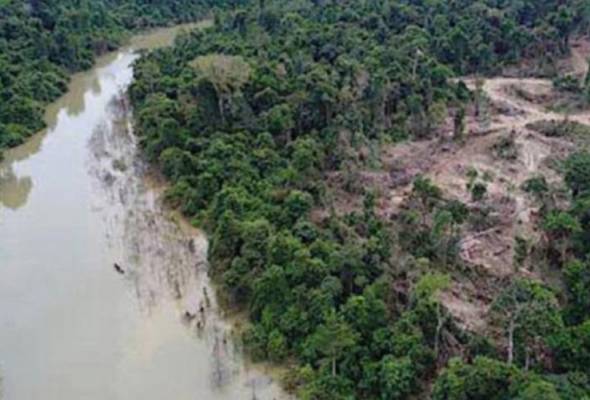
Published in Astro Awani and The Malaysian Insight, image by Astro Awani.
In Malaysia, surface water flows provide 97% of the country’s water needs and reservoirs provide for the majority of the country’s water storage according to the Asian Development Bank (ADB).
The ADB also highlighted that Malaysia’s water supply is vulnerable to weather extremes and unpredictable rainfall rates wrought by climate change.
Securing the country’s water supply entails the security of the sources of the supply chain (which equates to water security) – which (in turn) are (reducible to) the water catchment areas (i.e., the hydrological environment).
As stated by Perbadanan Bekalan Air Pulau Pinang Sdn Bhd (PBAPP) and PBA Holdings CEO Dato’ Ir. Jaseni Maidinsa, “[w]e could spend billions of ringgit to build a new dam today. However, this new dam will not be useful if it cannot be filled with raw water from its water catchment area”. Likewise, “[w]e may spend millions more ringgit to upgrade a water treatment plant. However, we cannot produce more treated water if there is insufficient raw water to [extract] from a river or a dam”.
The water catchment areas are usually rainforests that catch rainwater whenever it rains. The raw water then flows into rivers which then via the respective tributaries is transported into the sea or otherwise will be diverted fill up our dams – by way of impoundment of the reservoir – which are the main sources of treated water.
As it is, rampant deforestation can have an impact on our water supply when logging occurs close to dams, increasing soil erosion and siltation which causes water pollution. Consequently, the dam’s “lifespan” would be shortened.
The water catchment areas of the forest will also be affected. As a result, there won’t be any forests to collect and store rainwater.
Dwindling water catchment areas equals a danger sign at a highly critical level and imperils our water security.
Research done in Malawi highlighted how the country which has faced rampant deforestation over the years saw the corresponding diminution of safe drinking water access to households. This is due to Malawi losing 14% of its forest cover between 2000 and 2010 which resulted in a 9% reduction in rainfall (see, “Effect of deforestation on access to clean drinking water”, The Proceedings of the National Academy of Sciences, March 25, 2019).
However, we should not be complacent as we are not that far behind. Rather unsurprisingly, Malaysia was ranked 9th in the world for the loss of tree cover between 2001 and 2021 by the Global Forest Watch (see Figure 1). During the past two decades of deforestation, Malaysia has lost 30% of tree cover since 2000 onwards and this represents a 2% of the global total (which is much higher than 0.22% in terms of our land mass out of the global total).
Figure 1
Source: Global Forest Watch
If (rampant) deforestation persists at an alarming rate, Malaysia will face severe consequences as a result of water insecurity.
The ADB and World Bank in a 2021 joint-report – Climate Risk Country Profile: Malaysia – have stated that changes in water supply will also affect the plant and crop water demands. Early-season droughts and floods may result in yield reductions of up to 60%, and may have an impact on the production of cocoa, palm oil, and rubber in the country.
Due to warming climate, it is anticipated that Malaysia would experience heat waves more frequently and more intensely as well.
Ulu Muda Forest Reserve (UMFR) located in Kedah is considered as a premier water catchment area for Malaysia as it provides the main water supply for irrigation to the Northern Corridor Economic Region (NCER) which contains the nation’s “rice bowl”.
President of Malaysian Nature Society Prof Dr Ahmad Ismail is reported to have said that the country’s rice industry could be threatened since the UMFR is used to irrigate 96,558 hectare of rice fields in the Muda Agricultural Development Authority (MADA) area which accounts for 40% of total rice production although covering only 23% of the overall rice cultivation area.
In other words, water insecurity will also impact and threaten our food security of which rice is the leading staple.
Nevertheless, the country continues to be beholden to rampant deforestation caused by greed – since the logging and timber business is a steady source of lucrative income for the state government and the relevant local authorities.
Conservation and environmental science news platform Mongabay (“Logging in Malaysia’s Ulu Muda forest threatens wildlife and water supplies”, June 26, 2017) has pointed out that the lead culprits are the political parties in power. The deforestation of Kedah’s forests went up when the Islamist party Pas took control of the state in 2008.
Later in 2013, when BN took control of the state, logging continued unabated on the basis that the permits that have already been issued must be respected (for the sake of the sanctity of contracts).
Only when there was another change of government at both federal and state levels in 2018 did the rate of deforestation dropped dramatically which spilled over into the movement control order (MCO) period.
According to Southeast Asia Globe (“Can oil palm explain Malaysia’s decreasing forest loss?”, May 5, 2021), oil palm area within Malaysia contracted in 2020 (partly due to the government’s self–imposed cap of 6.5 million hectares nationwide) – the first drop in 44 years so that commercial agriculture is now said to be responsible for 94% of Malaysia’s loss of tree cover.
Pas officials claim that timber concessions (licenses) are the only way that state revenue could be derived viably (as reported by Mongabay).
But in 2018, the Ministry of Finance (MOF) named Kelantan, which has been under the rule of PAS for decades, as the state with the greatest debt level to the federal government.
Kelantan is also notorious for the on-going logging activities in the Nenggiri Forest Reserve which have caused anxiety among the local Orang Asli inhabitants.
The complacency and denial syndrome were displayed by a PAS MP Ahmad Fadhli Shaari (Pasir Mas) in July this year, when he insisted – in defiance of the large-scale logging activities in Kelantan – that the state still enjoys large swathes of forest reserves and remains as one of the nation’s green lungs (see, “K’tan MP: States attacked for logging despite being nation’s lungs”, Malaysiakini, July 18, 2022).
While logging is a “quick” option for the state to make money, but obviously it is not sustainable in the long-term – not to mention the adverse side-effects of which water insecurity is a critical concern.
However, despite lower deforestation rate in 2020, in same year twenty-two NGOs has expressed their shock when it was revealed logging activities in the Ulu Muda forest reserve persists (see, “NGOs shocked by logging activities in greater Ulu Muda Forest”, Sahabat Alam Malaysia, November 25, 2020).
The claim was made by comparison from satellite images between May and November 2020 within the Greater Ulu Muda Forest Reserve.
Questions are raised as to whether the Reducing Emissions from Deforestation and Forest Degradation (REDD+) Finance Framework which is supposed to have been supplemented and complemented by additional funds from the federal government have been effectively utilised to maintain the Greater Ulu Muda Forest Reserve.
Lim Teckwyn, co-founder of Resource Stewardship Consultants and a lecturer at the University of Nottingham Malaysia, believes that legal logging is more disruptive than illegal logging. This is because the term, “forest reserve” does not provide protection from logging activities under what is called “forest timber production under sustained yield” within Schedule 1 of the National Forestry Act (1984).
The majority of the logging in Ulu Muda is done legally, according to Earth Lodge CEO Hymeir Kamarudin, who also criticised Kedah’s decision-makers for “neglecting” Ulu Muda’s importance as a primary water catchment region.
It is to be noted that despite the state government losing millions of ringgit in potential revenue, the then Kedah Menteri Besar Datuk Seri Mukhriz Mahathir had decided to halt logging operations in the region in 2018.
However, many NGOs believed the state can and must do better. Prof Dr Ahmad Ismail, President of the Malaysian Nature Society (MNS), believes that by gazetting UMFR as a “state park” under Kedah’s enactment (state legislation), it will remain unaffected even if the state’s leadership or administration changes.
EMIR Research would like add by proposing the following policy recommendations:
- An indefinite total moratorium on logging in permanent forest reserves (PRFs). If need be, Parliament should pass a short legislation to override state jurisdiction. In this connection, there should be total protection of the PRFs by abolishing the establishment of forest or monoculture plantations in line with the call made by SAM – going beyond the decision of the 79th National Land Council (Dec 2, 2021) to implement a 15-year moratorium (see EMIR Research article, “Stop Illegal logging once and for all to minimise the occurrence of landslides and floods, January 17, 2022).
This definitively includes the UMFR.
- New reforestation campaigns – under the Malaysian Forestry Policy and by inclusion the Peninsular Malaysia Forestry Policy, Sabah Forestry Policy and Sarawak Forestry Policy – must be launched for the restoration of deforested regions, including the UMFR.
- The setting up of an UMFR Strategic Fund – with the seed money from both the federal and state governments and “matched” by investments from the private sector (e.g., public listed corporations, private equity and venture capital, etc.).
Investment schemes can include “nature conservation agreements” leveraging on “natural capital benefits”. This can be part of the long-term strategic plan to enhance Malaysia’s reputation as a leading carbon market in Asia and globally.
The Fund must be managed solely by the federal government and accountable to Parliament.
It is time that we put a stop to the incessant “mockery” of Mother Nature in the form of excessive and rampant logging – where the logic of profit intertwines with politics via resource extraction.
Jason Loh and Nik Nurdiana Zulkifli are part of the research team of EMIR Research, an independent think tank focused on strategic policy recommendations based on rigorous research.

